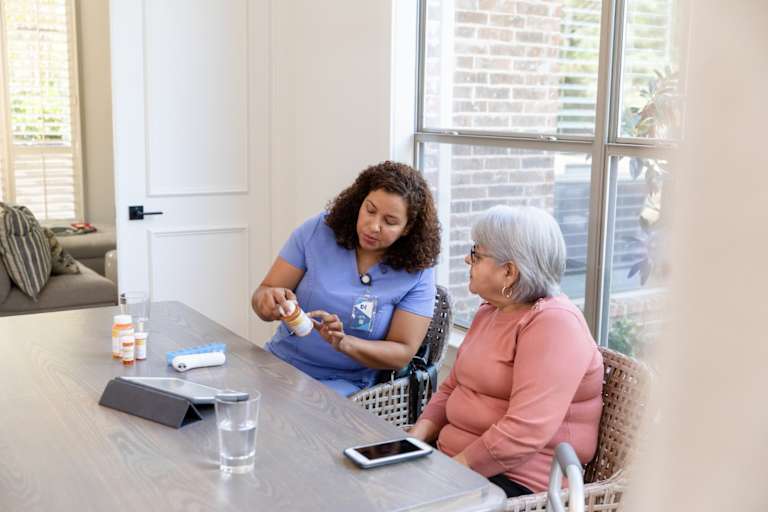What Does a Nursing Professional Development Specialist Do?
 Credit: sturti / E+ / Getty Images
Credit: sturti / E+ / Getty ImagesIn nearly every healthcare setting, there are many nursing career paths to follow. One path is a nursing professional development specialist who is an expert in both education and nursing. They often advise nurses on professional development tools and resources.
This role continues to grow because of the complexity of nursing and the need for continuing education for nurses. Nursing professional development specialists can also help to reduce turnover. Their work keeps nurses engaged and motivated through professional development opportunities, coaching and mentoring, and teaching nurses how to reach their career goals.
Keep reading to explore what a nursing professional development specialist does, how to become one, and what to expect in this nursing career.
Nursing Professional Development Specialist Career Overview
Primary Responsibilities
In a typical role, a nursing professional development specialist must:
- Understand the organization’s staffing and educational needs
- Lead nursing onboarding, especially for newer nurses
- Plan and deliver in-house education or hire external experts
- Work with learners one-on-one to help them plan their nursing professional development
- Collaborate with department and team leaders to identify their teams’ unmet or future needs
- Keep up to date on evidence-based practice in nursing and adult education
- Maintain familiarity with nursing professional development resources, like nursing schools, professional associations, continuing education providers, and nursing literature
- Keep up to date on state regulations and requirements for nursing continuing education and professional development
- Document and keep records of professional development
- Manage nursing professional development budgets
- Navigate educational technology, such as learning management systems
Career Traits
To succeed as a nursing professional development specialist, you should have:
- A strong understanding of adult learning principles and practices
- Excellent coaching and mentoring skills
- A desire for lifelong learning
- Research and analytical abilities to determine nursing professional development needs through surveys, focus groups, one-on-one interviews, and other research methods
- The capability to track trends for future learning needs and opportunities
- Expertise in measuring results or data and assessing learning outcomes for an organization
- Flexibility to adapt or change learning strategies based on outcomes
- A broad knowledge of educational providers and opportunities
- Experience in helping nurses connect what they learn to their work
- High communication skills with new nurses, experienced nurses, and administration
- Strong management skills, especially when new evidence-based practices require modifying or replacing approaches or when balancing different priorities among various stakeholders
How to Become a Nursing Professional Development Specialist
There are three steps to becoming a nursing professional development specialist: earn a degree in nursing, get licensed, and receive certification.
Degree
The type of nursing degree you need to be a nursing professional development specialist depends on what kind of job you want and the type of organization where you wish to work. Most organizations and certifications require at least a bachelor of science in nursing (BSN). If you want to teach in a nursing school or work at an academic medical center, you need at least a master of science in nursing.
Many nursing schools, especially graduate schools, prefer a doctorate. Usually, a nursing professional development specialist holds a BSN or master’s in nursing or adult education.
License
You must become a registered nurse (RN) and hold a current, unencumbered nursing license. Registered nursing requirements vary by state, but you have to graduate from an accredited program and pass the NCLEX. You also need to maintain your license by meeting nursing continuing education requirements.
Certification
While not required, certification as a nursing professional development specialist demonstrates your mastery of professional development knowledge and commitment to the profession. Many employers, especially large hospitals and academic medical centers, require or strongly prefer certification.
The American Nurses Credentialing Center offers board certification in nursing professional development. To be eligible, you need a bachelor’s degree or higher and the equivalent of two years of full-time experience as an RN. You will also need at least 2,000 hours of clinical practice in nursing professional development and at least 30 hours of continuing education in nursing professional development within the last three years. You must also pass the board examination, which includes 175 multiple-choice questions.
The Benefits of Becoming a Nursing Professional Development Specialist
If you enjoy teaching and helping others succeed, keeping up with research and professional trends, engaging in lifelong learning, and are a good coach and mentor, becoming a nursing professional development specialist may be the perfect job for you. Nursing professional development specialist’s work and hours offer more predictability than other nursing jobs, which can mean lower burnout rates.
Becoming a nursing professional development specialist allows you to contribute to the field of nursing and to your organization’s success. Nursing professional development specialists identify unmet learning needs, teach updated best practices, develop educational plans, measure results, and improve nursing outcomes.
As a nursing professional development specialist, you can work in various healthcare settings: hospitals or health systems, nursing schools, research organizations, public health offices or other government agencies, and clinics. You can also work with providers of nursing professional development and continuing education courses. These may include healthcare associations, commercial providers, or nonprofits.
Organizations that hire nursing professional development specialists value the importance of continuing education for nurses and will likely invest in your own professional development.
If you prefer working with educational technology, the growth of learning resources for organizations provides exciting opportunities. Some tools, such as learning management systems, offer advanced options for nurse educator careers. At the same time, we’re witnessing the emergence of new tools like virtual reality and augmented reality for learning. This opens new career paths for nursing professional development specialists, including opportunities with technology solutions companies to help shape the future of the field and bring in new ideas.
According to Glassdoor, the average annual salary of a nursing professional development specialist is $73,390 as of August 2021. This figure is comparable to the median annual RN salary of $75,330 reported by the U.S. Bureau of Labor Statistics and considerably above the U.S. annual median salary of $41,950.
Whether you are starting your nursing career or are looking for a new direction, the role of nursing professional developmental specialist can help you improve nursing outcomes for patients, fellow nurses, your organization, and the profession as a whole.
You might be interested in

Nurse Researcher Career Overview
This guide provides information on nurse researcher responsibilities, career pathways, and salaries. Learn how to advance nursing through nursing research.

Jobs for Nurses: 50+ Different Nursing Positions
What can you do with a nursing degree? Explore what nurses do and the different nursing jobs available to licensed nurses.

The 35 Best Specialty Career Choices for Nurses
Explore the best specialty career options available to nurses while reviewing the potential job growth and salary potential for each.